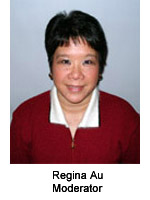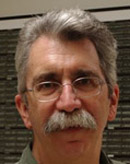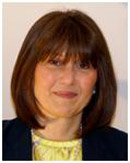
Breakout Session
Thursday, June 21, 2012
10:00 am – 11:30 am
Using Systems Biology to “Fast-Track” Development and Approval of Novel Therapeutics and Diagnostics
Track: Personalized Medicine
Session ID: 1188
Room #: 258-B
Brief overview of Systems Biology and how its application can determine more precisely and quickly which biomarkers are relevant to specific diseases for diagnosis or therapeutic intervention. This approach can also determine subgroups or different genotypes within these diseases in developing a diagnostic test that will determine whether a patient will respond to a specific drug with minimal side effects.
Drugs can now be targeted for a specific set of patients resulting in higher efficacy. In return, the FDA requirements for the number of patients required for the phase I-III trials maybe smaller, the cost and time for R&D will be reduced and the approval time will be shorter.
Our objectives for the audience are the following:
1) Learn how Systems Biology provides a framework for understanding how diseases work within the network of the whole body.
2) Discuss how this approach can be used in personalize medicine, by linking diagnostic tests to drug therapies.
3) Discuss the potential benefits: better drug efficacy, minimal side effects, faster drug approval, and lower R&D costs
The biographies of the Moderator and Speakers are presented below.
 Regina Au is a Strategic Marketing Consultant at BioMarketing Insight specializing in the biotechnology, pharmaceutical, medical device, and diagnostic industries. She helps companies evaluate their technology upfront by conducting the business due diligence in de-risking the product development process. This ensures that the technology is the right product for the right market and that the market potential for the product meets the business goals of the company. Ms. Au then develops marketing strategies to ensure a successful product launch.Prior to BioMarketing Insight she worked for companies such as Merck & Co., Genzyme Corp., The Clinipad Corp., and NMT Medical in various positions of increasing responsibility in marketing and sales. She had P&L responsibility in managing several multimillion dollar product lines, been involved in the development of a number of new products, and launched numerous new products.Her background includes an MBA in Marketing from the University of Connecticut, a Microbiology degree from the University of Michigan and a Masters in International Management from Thunderbird School of Global Management. Regina Au is a Strategic Marketing Consultant at BioMarketing Insight specializing in the biotechnology, pharmaceutical, medical device, and diagnostic industries. She helps companies evaluate their technology upfront by conducting the business due diligence in de-risking the product development process. This ensures that the technology is the right product for the right market and that the market potential for the product meets the business goals of the company. Ms. Au then develops marketing strategies to ensure a successful product launch.Prior to BioMarketing Insight she worked for companies such as Merck & Co., Genzyme Corp., The Clinipad Corp., and NMT Medical in various positions of increasing responsibility in marketing and sales. She had P&L responsibility in managing several multimillion dollar product lines, been involved in the development of a number of new products, and launched numerous new products.Her background includes an MBA in Marketing from the University of Connecticut, a Microbiology degree from the University of Michigan and a Masters in International Management from Thunderbird School of Global Management. |
 David E. Hill, Ph.D., is a Principal Research Scientist in Cancer Biology and Associate Director of the Center for Cancer Systems Biology (CCSB) at the Dana-Farber Cancer Institute (DFCI). CCSB explores biological processes relevant to cancer from a systems point of view. The overall goal of CCSB is to understand how macromolecular networks control cellular and developmental processes and on how alterations in network structure contribute to disease states.Dr. Hill joined the DFCI in 2000 as a Visiting Scientist in Cancer Biology and together with Dr. Marc Vidal started CCSB in 2004, the first of the DFCI Integrated Strategic Initiative Research Centers, where he co-directs CCSB ORFeome cloning efforts that have resulted in collections of over 18,000 Human ORFs and 12,000 worm ORFs, directs various viral and bacterial ORFeome projects at CCSB, and co-directs the generation of binary protein-protein interactome networks for human and model organisms.Dr. Hill has published and spoken extensively on the 1) development and generation of ORFeome collections, 2) the generation of binary protein-protein interactome networks for human and model organisms and 3) how interactome network features are perturbed as a result of genetic variations and environmental stresses leading to disease.Dr. Hill graduated from Indiana University with a B.A. in Economics and a Ph.D. in Molecular, Cellular, and Developmental Biology. Following post-doctoral studies at Harvard Medical School on transcriptional regulation in Saccharomyces cerevisiae, he worked in the biotech industry for 14 years, developing reagents for the study of apoptosis, cancer susceptibility, DNA damage response, and cell cycle checkpoints.Dr. Hill serves as chairman or ad hoc member on NIH and NCI extramural grant reviews panels, was a member of the Scientific Advisory Board of the A-T Children’s Project and served as a faculty member in the AACR course “Molecular Biology in Clinical Oncology.” David E. Hill, Ph.D., is a Principal Research Scientist in Cancer Biology and Associate Director of the Center for Cancer Systems Biology (CCSB) at the Dana-Farber Cancer Institute (DFCI). CCSB explores biological processes relevant to cancer from a systems point of view. The overall goal of CCSB is to understand how macromolecular networks control cellular and developmental processes and on how alterations in network structure contribute to disease states.Dr. Hill joined the DFCI in 2000 as a Visiting Scientist in Cancer Biology and together with Dr. Marc Vidal started CCSB in 2004, the first of the DFCI Integrated Strategic Initiative Research Centers, where he co-directs CCSB ORFeome cloning efforts that have resulted in collections of over 18,000 Human ORFs and 12,000 worm ORFs, directs various viral and bacterial ORFeome projects at CCSB, and co-directs the generation of binary protein-protein interactome networks for human and model organisms.Dr. Hill has published and spoken extensively on the 1) development and generation of ORFeome collections, 2) the generation of binary protein-protein interactome networks for human and model organisms and 3) how interactome network features are perturbed as a result of genetic variations and environmental stresses leading to disease.Dr. Hill graduated from Indiana University with a B.A. in Economics and a Ph.D. in Molecular, Cellular, and Developmental Biology. Following post-doctoral studies at Harvard Medical School on transcriptional regulation in Saccharomyces cerevisiae, he worked in the biotech industry for 14 years, developing reagents for the study of apoptosis, cancer susceptibility, DNA damage response, and cell cycle checkpoints.Dr. Hill serves as chairman or ad hoc member on NIH and NCI extramural grant reviews panels, was a member of the Scientific Advisory Board of the A-T Children’s Project and served as a faculty member in the AACR course “Molecular Biology in Clinical Oncology.” |
 Dr. J. Carl Barrett is Vice President of Translational Science in the Oncology Innovative Medicines Unit at AstraZeneca Pharmaceuticals. His responsibility is to develop and execute biomarker strategy and translational sciences efforts to support compound development from research through early and full development in oncology. From 2005-2011, he was Global Head of Oncology Biomarkers and Imaging in Novartis Oncology Translational Medicine.Prior to joining Novartis, Dr. Barrett was the founding Director of the NCI Center for Cancer Research (CCR), which is the NCI intramural center for translation medicine and novel technologies. Prior to joining NCI, Dr. Barrett was the Scientific Director at the National Institute of Environmental Health Sciences where his efforts focused on integrating new approaches to toxicology by utilization of molecular approaches of toxicogenomics, molecular toxicology, and the Environmental Genome Project.Dr. Barrett’s longstanding research interests focus on the discovery of the critical genetic and epigenetic changes in the cancer cell, in particular the discovery of genes involved in breast cancer (BRCA1) and in the processes of cellular senescence and cancer metastasis. He has made significant contributions to the identification of molecular defects in cancers and the role of the biosystem in the carcinogenesis process.Trained as a chemist at the College of William and Mary, Dr Barrett received his Ph.D. degree in Biophysical Chemistry from Johns Hopkins University. He has published over 600 research articles and reviews in leading scientific journals and books. He is a member of the Johns Hopkins University Society of Scholars, an elected member of the Ramazini Foundation, an honorary member of the Japanese Cancer Association, and a recipient of multiple NIH awards and Keynote lectures. Dr. J. Carl Barrett is Vice President of Translational Science in the Oncology Innovative Medicines Unit at AstraZeneca Pharmaceuticals. His responsibility is to develop and execute biomarker strategy and translational sciences efforts to support compound development from research through early and full development in oncology. From 2005-2011, he was Global Head of Oncology Biomarkers and Imaging in Novartis Oncology Translational Medicine.Prior to joining Novartis, Dr. Barrett was the founding Director of the NCI Center for Cancer Research (CCR), which is the NCI intramural center for translation medicine and novel technologies. Prior to joining NCI, Dr. Barrett was the Scientific Director at the National Institute of Environmental Health Sciences where his efforts focused on integrating new approaches to toxicology by utilization of molecular approaches of toxicogenomics, molecular toxicology, and the Environmental Genome Project.Dr. Barrett’s longstanding research interests focus on the discovery of the critical genetic and epigenetic changes in the cancer cell, in particular the discovery of genes involved in breast cancer (BRCA1) and in the processes of cellular senescence and cancer metastasis. He has made significant contributions to the identification of molecular defects in cancers and the role of the biosystem in the carcinogenesis process.Trained as a chemist at the College of William and Mary, Dr Barrett received his Ph.D. degree in Biophysical Chemistry from Johns Hopkins University. He has published over 600 research articles and reviews in leading scientific journals and books. He is a member of the Johns Hopkins University Society of Scholars, an elected member of the Ramazini Foundation, an honorary member of the Japanese Cancer Association, and a recipient of multiple NIH awards and Keynote lectures. |
 Nikolai Kley, Ph.D., is Founder and Vice President of Discovery Biology for Forma Therapeutics. Prior to joining FORMA, Dr. Kley was Vice President and Head of Research at GPC Biotech. Dr. Kley was an early member of the GPC Biotech management team (1999-2007) and played key roles in developing and advancing the company’s genomics, proteomics, chemical proteomics and biology technology platforms, in attracting and managing multimillion dollar government grants and strategic alliances with pharmaceutical companies, and in building GPC Biotech’s preclinical oncology drug discovery pipeline and translational research capabilities.From 1997-1999 he was Director and Vice President, Functional Genomics, at Genome Therapeutics Corporation. Prior to that Dr. Kley was Senior Research Investigator, Group Leader and Head of Tumor Suppressor Program in the Oncology Division at Bristol Myers Squibb Pharmaceutical Research Institute (Princeton), and a Visiting Research Scholar (Research Professor) at Princeton University. Dr. Kley was a postdoctoral fellow in Neuro-Oncology at Massachusetts General Hospital and Harvard Medical School.He received his Ph.D. in Biochemistry from the Max-Planck Institute (Martinsried, Germany) and Ludwig Maximillian University (Munich, Germany), and was a recipient of the Otto Hahn Medal Award (Max Planck Society) and Junior Investigator Award of the National Neurofibromatosis Foundation, which he later also served as member of the scientific advisory board. He received his B.Sc.Hon. in Biochemistry/Physiology from Leeds University (UK) and his earlier education at the European School in Varese, Italy. Nikolai Kley, Ph.D., is Founder and Vice President of Discovery Biology for Forma Therapeutics. Prior to joining FORMA, Dr. Kley was Vice President and Head of Research at GPC Biotech. Dr. Kley was an early member of the GPC Biotech management team (1999-2007) and played key roles in developing and advancing the company’s genomics, proteomics, chemical proteomics and biology technology platforms, in attracting and managing multimillion dollar government grants and strategic alliances with pharmaceutical companies, and in building GPC Biotech’s preclinical oncology drug discovery pipeline and translational research capabilities.From 1997-1999 he was Director and Vice President, Functional Genomics, at Genome Therapeutics Corporation. Prior to that Dr. Kley was Senior Research Investigator, Group Leader and Head of Tumor Suppressor Program in the Oncology Division at Bristol Myers Squibb Pharmaceutical Research Institute (Princeton), and a Visiting Research Scholar (Research Professor) at Princeton University. Dr. Kley was a postdoctoral fellow in Neuro-Oncology at Massachusetts General Hospital and Harvard Medical School.He received his Ph.D. in Biochemistry from the Max-Planck Institute (Martinsried, Germany) and Ludwig Maximillian University (Munich, Germany), and was a recipient of the Otto Hahn Medal Award (Max Planck Society) and Junior Investigator Award of the National Neurofibromatosis Foundation, which he later also served as member of the scientific advisory board. He received his B.Sc.Hon. in Biochemistry/Physiology from Leeds University (UK) and his earlier education at the European School in Varese, Italy. |
 Candida Fratazzi, M.D., is a Clinical Strategy and Trial Design Specialist with over 25 years of experience. She is a recognized expert in the development of Orphan indications and Rare Disease clinical trial designs. Dr. Fratazzi is President at Boston Biotech Clinical Research, LLC (BBCR) since 2009. Prior to her full commitment to BBCR she served as Senior Medical Leader at Altus, Shire HGT, Johnson & Johnson and Wyeth Pharmaceuticals.During her career, Dr. Fratazzi developed clinical strategies and development plans for many drug candidates, presented in INDs and end-of-phase2 briefing documents. Furthermore, Dr. Fratazzi devoted a special attention to drug safety and risk management recognizing its critical value. Her work resulted in the market approval of several orphan indication therapies such as Velaglucerase alphaŽ (Shire), ReplagalŽ (Shire), Lipoprotamase (Alnara) and the antibiotic TigecyclineŽ IV (Wyeth).Before joining industry, Dr. Fratazzi served on the faculties of Harvard University, John Hopkins University and Imperial College (London, UK), Schools of Medicine. During her academic years, Dr. Fratazzi co-authored over 50 scientific papers in peer review journals. http://www.bostonclinicalresearch.com. Candida Fratazzi, M.D., is a Clinical Strategy and Trial Design Specialist with over 25 years of experience. She is a recognized expert in the development of Orphan indications and Rare Disease clinical trial designs. Dr. Fratazzi is President at Boston Biotech Clinical Research, LLC (BBCR) since 2009. Prior to her full commitment to BBCR she served as Senior Medical Leader at Altus, Shire HGT, Johnson & Johnson and Wyeth Pharmaceuticals.During her career, Dr. Fratazzi developed clinical strategies and development plans for many drug candidates, presented in INDs and end-of-phase2 briefing documents. Furthermore, Dr. Fratazzi devoted a special attention to drug safety and risk management recognizing its critical value. Her work resulted in the market approval of several orphan indication therapies such as Velaglucerase alphaŽ (Shire), ReplagalŽ (Shire), Lipoprotamase (Alnara) and the antibiotic TigecyclineŽ IV (Wyeth).Before joining industry, Dr. Fratazzi served on the faculties of Harvard University, John Hopkins University and Imperial College (London, UK), Schools of Medicine. During her academic years, Dr. Fratazzi co-authored over 50 scientific papers in peer review journals. http://www.bostonclinicalresearch.com. |
 Candida Fratazzi, M.D., is a Clinical Strategy and Trial Design Specialist with over 25 years of experience. She is a recognized expert in the development of Orphan indications and Rare Disease clinical trial designs. Dr. Fratazzi is President at Boston Biotech Clinical Research, LLC (BBCR) since 2009. Prior to her full commitment to BBCR she served as Senior Medical Leader at Altus, Shire HGT, Johnson & Johnson and Wyeth Pharmaceuticals.During her career, Dr. Fratazzi developed clinical strategies and development plans for many drug candidates, presented in INDs and end-of-phase2 briefing documents. Furthermore, Dr. Fratazzi devoted a special attention to drug safety and risk management recognizing its critical value. Her work resulted in the market approval of several orphan indication therapies such as Velaglucerase alphaŽ (Shire), ReplagalŽ (Shire), Lipoprotamase (Alnara) and the antibiotic TigecyclineŽ IV (Wyeth).Before joining industry, Dr. Fratazzi served on the faculties of Harvard University, John Hopkins University and Imperial College (London, UK), Schools of Medicine. During her academic years, Dr. Fratazzi co-authored over 50 scientific papers in peer review journals. http://www.bostonclinicalresearch.com.
Candida Fratazzi, M.D., is a Clinical Strategy and Trial Design Specialist with over 25 years of experience. She is a recognized expert in the development of Orphan indications and Rare Disease clinical trial designs. Dr. Fratazzi is President at Boston Biotech Clinical Research, LLC (BBCR) since 2009. Prior to her full commitment to BBCR she served as Senior Medical Leader at Altus, Shire HGT, Johnson & Johnson and Wyeth Pharmaceuticals.During her career, Dr. Fratazzi developed clinical strategies and development plans for many drug candidates, presented in INDs and end-of-phase2 briefing documents. Furthermore, Dr. Fratazzi devoted a special attention to drug safety and risk management recognizing its critical value. Her work resulted in the market approval of several orphan indication therapies such as Velaglucerase alphaŽ (Shire), ReplagalŽ (Shire), Lipoprotamase (Alnara) and the antibiotic TigecyclineŽ IV (Wyeth).Before joining industry, Dr. Fratazzi served on the faculties of Harvard University, John Hopkins University and Imperial College (London, UK), Schools of Medicine. During her academic years, Dr. Fratazzi co-authored over 50 scientific papers in peer review journals. http://www.bostonclinicalresearch.com.





